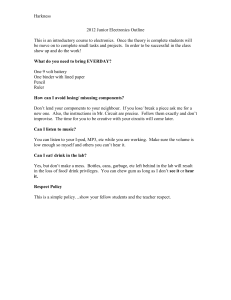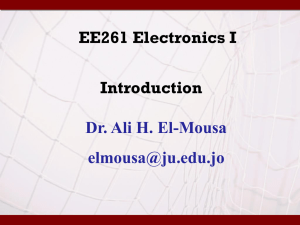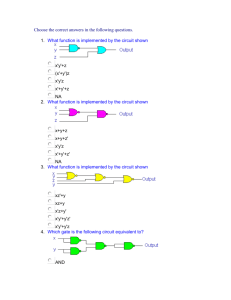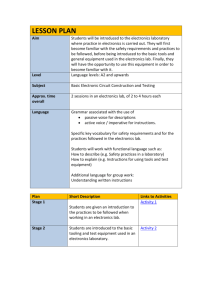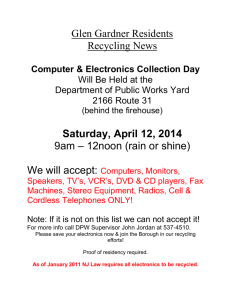Curriculum Map
advertisement
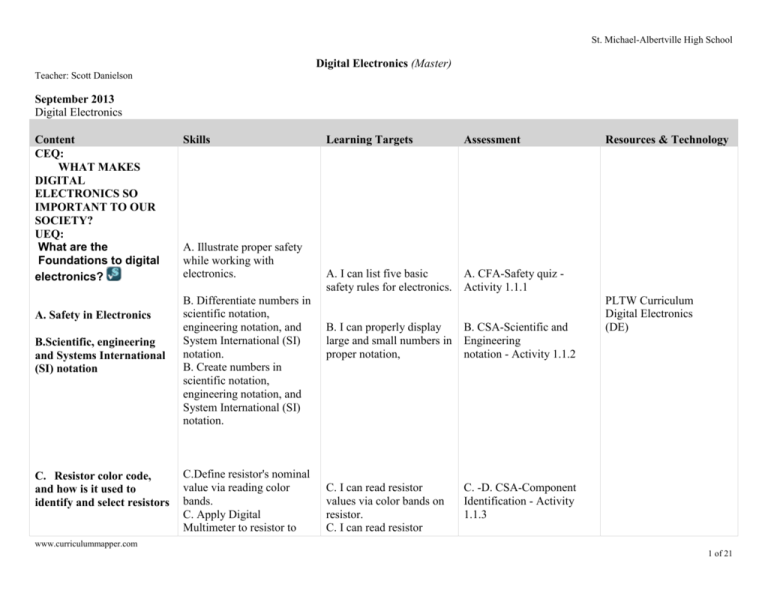
St. Michael-Albertville High School Digital Electronics (Master) Teacher: Scott Danielson September 2013 Digital Electronics Content CEQ: WHAT MAKES DIGITAL ELECTRONICS SO IMPORTANT TO OUR SOCIETY? UEQ: What are the Foundations to digital electronics? A. Safety in Electronics B.Scientific, engineering and Systems International (SI) notation C. Resistor color code, and how is it used to identify and select resistors Skills A. Illustrate proper safety while working with electronics. B. Differentiate numbers in scientific notation, engineering notation, and System International (SI) notation. B. Create numbers in scientific notation, engineering notation, and System International (SI) notation. C.Define resistor's nominal value via reading color bands. C. Apply Digital Multimeter to resistor to Learning Targets Assessment A. I can list five basic safety rules for electronics. A. CFA-Safety quiz Activity 1.1.1 B. I can properly display large and small numbers in proper notation, B. CSA-Scientific and Engineering notation - Activity 1.1.2 C. I can read resistor values via color bands on resistor. C. I can read resistor C. -D. CSA-Component Identification - Activity 1.1.3 Resources & Technology PLTW Curriculum Digital Electronics (DE) www.curriculummapper.com 1 of 21 Danielson Content D. What is the labeling nomenclature for capacitors, and how is it used to identify and select capacitors? Digital Electronics (Master) Skills determine resistor's actual value. D. Describe many of the common components used in electronics. D. Identify many of the common components used in electronics. D. Define capacitor's nominal value via reading its nomenclature. Learning Targets values using a multimeter, St. Michael-Albertville High School Assessment Resources & Technology D. I can describe and identify ten different common components used in electronics. D. I can read values of any capacitor. E. Soldering UEQ: What is Analog Electronics? E. Create a properly tin the tip of a soldering iron. E. Apply proper soldering and de-soldering techniques. A. Analog vs, digital signals E. CSA- Soldering and Desoldering- Activity 1.1.4 E. I can prepare and safely use a soldering iron to assemble an electronic project. E. I can clean up a poor solder joint by using desoldering techniques. A, Illustrate sine waves for analog and digital signals. B. What are the voltage levels associated with digital signals? C. What is the voltage B.-C. Be able to determine the amplitude, period, frequency, and duty cycle analog and digital signals. PLTW Curriculum Digital Electronics (DE) A.CSA- Analog and DIgital signals -Activity 1.2.5 A. I can draw, re-draw and label the differences B. CSA-555 timers- www.curriculummapper.com 2 of 21 Digital Electronics (Master) Danielson Content range of an analog signal? D. What determines whether a material is a conductor, an insulator, or a semiconductor? E. What is the hrefationship between voltage, current, and resistance in an electrical circuit? F. What is true about the sum of all voltages around a closed path in an electrical circuit? Skills D. Be able to identify the parts of an atom and determine if an element would make a good conductor, insulator, or semiconductor. E. Use Ohm’s Law, Kirchhoff’s Voltage Law, and Kirchhoff’s Current Law to solve for simple series and parallel circuit. F. Be able to use a Circuit Design Software (CDS) to analyze simple analog circuits. G. What is a breadboard, and what is it used for? G. Be able to use a breadboard and digital multimeter to analyze simple analog circuits. Learning Targets between analog and digital sine waves. B. I can label a sine wave diagram with proper digital voltage. C. I can label a sine wave diagram with proper analog voltage. St. Michael-Albertville High School Assessment Activity 1.2.6 C.CSA- Board game counter - Activity 1.2.7 Resources & Technology D. CSA-Electron Theory Activity 1.2.1 D. I can label the parts of an atom and the outer rings E. CSA-Circuit TheoryActivity 1.2.2 E. I can solve math problems related to Ohm’s Law, Kirchhoff’s Voltage Law, and Kirchhoff’s Current Law. F. I can demonstrate proper use of CDS for analog circuits. F. CSA- Circuit Theorysimulation -Activity 1.2.3 G. CSA-Circuit Theorybreadboarding -Activity 1.2.4 G. I can build a curcuit on a breadboard and analyze it using a multimeter. www.curriculummapper.com 3 of 21 Digital Electronics (Master) Danielson St. Michael-Albertville High School October 2013 Digital Electronics Content UEQ: What is Skills Learning Targets Assessment A. Be able to obtain and extract information from the manufacturer datasheets for components commonly used in digital electronics. A. I can locate and read datasheet information for required components. A. CSA- Intro to Logic and datasheets- Activity 1.3.4 B. I can locate and utilize electronic components when working in CDS or with a breadboard. B.-E CSA-Combinational Logic- Activity 1.3.1 Resources & Technology Digital Electronics A. What information is contained in a manufacturer datasheet for logic gates? B. What are the three characteristics that categorize integrated circuits? C. What are the available Transistor-Transistor Logic sub-families? D. What are the three ways to depict any logic gate? E. What are the outputs of combinational logic a function of? B.Know how to identify commonly used electronic components given their part number or schematic symbol. C. -D . Be able to identify various integrated circuit (IC) package styles. E. Know the fundamental differences between combinational and sequential logic. F. What is AOI logic? PLTW Curriculum Digital Electronics (DE) C.- D. I can describe a component so others can identify their package. E. I can list 5 ways combinational and sequential are different. F. CSA-Board Game Counter- Activity 1.3.3 F. I can create a circuit utilizing AOI logic F. Identify and describe the www.curriculummapper.com 4 of 21 Danielson Content G. What are the outputs of sequential logic a function of? Digital Electronics (Master) Skills function of AND, OR, & Inverter gates. Learning Targets components. St. Michael-Albertville High School Assessment G.-H. CSA-Sequential Logic - Activity 1.3.2 H. What is the fundamental building block of sequential logic? G.-H. Identify and describe the function of a D flip-flop. G-H. I can create a circuit utilizing a D Flip-flop I. CFA-Board Game Counter- Activity 1.3.3 I. What are the steps for troubleshooting digital electronics circuits? I. Be able to use Circuit Design Software (CDS) to simulate and test a simple sequential logic circuit design with D flip-flops. I. I can utilize the CDS to design, draw, simulate and test sequential and combinational logic. PLTW Curriculum Digital Electronics (DE) UEQ: What is AOI Logic A. What are the processes for converting numbers between the binary and decimal number systems, and why is the understanding of these two numbers systems essential to your ability to design combinational logic circuits? B. What is the hrefationship between a combinational logic design’s truth table, logic Resources & Technology I. Utilize the Circuit Design Software (CDS) to simulate and test a complete design containing both combinational and sequential logic. A.CSA- Binary Numbers and Conversions- Activity 2.1.2 A. I can convert any binary or decimal number to its complement. A. Convert numbers between the binary and B. CSA- Truth Tables and www.curriculummapper.com 5 of 21 Digital Electronics (Master) Danielson Content expression, and circuit implementation?. Skills decimal number systems. Learning Targets St. Michael-Albertville High School Assessment Conversions- Activity 2.1.3 Resources & Technology B. I can design a circuit using truth tables and logic expressions. C. When you simplify a logic expression using Boolean algebra, how do you know that you have the simplest solution and that the solution is correct? D. In terms of circuit implementation, what is the advantage of representing all logic expression in either the SOP or POS form? E. Defend the following statement: “All logic expression, regardless of complexity, can be implemented with AND, OR, & Inverter Gates.” B. Translate design specifications into truth tables. B. Extract un-simplified logic expressions from truth tables. B. Construct truth tables from logic expressions. C Use the rules and laws of Boolean algebra, including DeMorgan’s, to simplify logic expressions. F. What are the steps in the design process of converting a set of design specifications into a functional combinational logic circuit? C. I can simplify logic expressions utilizing Boolean Algebra and DeMorgan's Theroems. C. CSA-Boolean AlgebraActivity 2.1.6 C. CSA-DeMorgan Thereoms- Activity 2.1.7 D. CSA- OI Logic Implementation- Activity 2.1.5 D. I can view a circuit and determine it's logic expression. E.CSA- AOI Logic Analysis- Activity 2.1.4 E.I can design a circuit uitizing AOI logic. D. Analyze AOI (AND/OR/Invert) www.curriculummapper.com 6 of 21 Digital Electronics (Master) Danielson Content Skills combinational logic circuits to determine their equivalent logic expressions and truth tables. Learning Targets E. Design combinational logic circuits using AOI logic gates. F . I can design a proper circuit for a given word problem. St. Michael-Albertville High School Assessment Resources & Technology F. CFA-Majority Vote Project - 2.1.1 E, Translate a set of design specifications into a functional AOI combinational logic circuit following a formal design process. F. Use Circuit Design Software (CDS) and a Digital Logic Board (DLB) to simulate and prototype AOI logic circuits November 2013 Digital Electronics Content UEQ: What is NAND and NOR Logic A. What is the process for using the K-Mapping technique to simplify a logic Skills Learning Targets Assessment Resources & Technology A. Apply Karnaugh Mapping technique to www.curriculummapper.com 7 of 21 Danielson Digital Electronics (Master) Content expression? What are the advantages of using this process over Boolean algebra? Skills simplify combinational logic problems with less than four inputs. B. What is a don’t care condition, and how can it be used in a K-Map to reduce the complexity of the combinational logic design? B. Solve Karnaugh Mapping that involves "don't care" condition(s). C. What does the term universal gate mean? Why are NAND gates and NOR gates considered universal gates? D. What is the advantage of implementing a combinational logic design with only NAND gates (or NOR gates)? E. What are the steps in the design process for converting an AOI combinational logic design into a NAND only or NOR only design? C. Design combinational logic circuit using NAND gates. D. Design combinational logic circuit using NOR gates. E.-F. Construct NAND logic circuit prototypes using Circuit Design Software and a Digital Logic Board. E.-F. Construct NOR logic circuit prototypes using Learning Targets A. -B. I can K-map a truth table to derive a simplified logic expression. St. Michael-Albertville High School Assessment A-B. CSA- K-Mapping Activity 2.2.1 Resources & Technology PLTW Curriculum Digital Electronics (DE) C. I can describe and create C.CSA- NAND Logic a circuit utilizing NAND Design - Activity 2.2.2 gates D. I can describe and create a circuit utilizing NAND gates D. CSA-NOR Logic Design - Activity 2.2.3 E.-F. I can create circuits in E.CSA-Logic Converter CDS to demonstrate proper Activity 2.2.4 use of NAND and NOR gates. F.CFA- Fireplace Control Circuit - Activity 2.2.5 www.curriculummapper.com 8 of 21 Danielson Digital Electronics (Master) Content Skills F. Typically, what is the circuit Design Software and advantage of NAND only a Digital Logic Board. design (or NOR only design) over an AOI design? Why is it important to it compare both the NAND only and NOR only designs? B. Why is it more difficult to design logic circuits with NAND logic or NOR logic than it is with straightforward AOI logic, in terms of circuit implementation. C. Why does a logic expression require fewer ICs to implement if NAND logic Assessment Resources & Technology PLTW Curriculum Digital Electronics (DE) A. I can design a circuit utilizing a seven segment display. F. Date of Birth Design A.. What is the hrefationship between the resistor value used, the amount of current flowing, and the brightness of a segment of seven-segment display. Learning Targets St. Michael-Albertville High School A. CSA- even Segment Display - Activity 2.3.1 A. Use a seven-segment display in a combinational logic design to display alpha/numeric values. B-E. CFA-Date of Birth project- Activity 2.3.2 B Select the correct current limiting resistor and properly wire both common cathode and common anode seven-segment displays. C Follow a formal design process to translate a set of design specifications for a www.curriculummapper.com 9 of 21 Digital Electronics (Master) Danielson Content or NOR logic is used than would be required if AOI logic were used. D. What are the steps in the design process of converting a set of design specifications, containing multiple outputs, into a functional combinational logic circuit? E. When compared to a design with a single output, is the process different for multiple outputs? Skills design containing multiple outputs into a functional combinational logic circuit. Learning Targets St. Michael-Albertville High School Assessment Resources & Technology D Design AOI, NAND, & NOR solutions for a logic expression and select the solution that uses the least number of ICs to implement. E Use Circuit Design Software (CDS) and Digital Logic Board (DLB) to simulate and prototype AOI, NAND, & NOR logic circuits. December 2013 Digital Electronics Content Skills Learning Targets Assessment Resources & Technology G. Specific Comb Logic Circuits & Misc. Topics A. What are the processes for converting numbers between the hexadecimal or octal and decimal number A. Convert numbers between the hexadecimal or octal number systems and the decimal number A. I can convert any octal, hex or decimal number to it's complement. A. CSA- Octal/Hex numbersActivity 2.4.1 PLTW Curriculum Digital Electronics (DE) www.curriculummapper.com 10 of 21 Digital Electronics (Master) Danielson Content Skills systems, and why is the understanding of these two numbers systems important to your comprehension of digital electronics? system. B. In terms of circuit complexity, what is the advantage of implementing binary half and full adders with XOR gates over other logic gates? B. Use XOR and XNOR gates to design binary half-adders and fulladders. C. Describe how the addition of two binary numbers of any bit length can be accomplished by cascading one half-adder with one or more full adders. C. Use SSI and MSI gates to design and implement binary adders. D. What is the basic operation of digital multiplexers and demultiplexers? D.-E. Design electronics displays using sevensegment displays that utilize de-multiplexers. E. Explain how digital demultiplexers are used to significantly reduce the amount of power required to operate the electronics displays that use multiple F. Use the two’s Learning Targets B. I can design a half or full adder circuit using XOR and XNOR gates. St. Michael-Albertville High School Assessment Resources & Technology B.-C. CSA- XOR/XNOR Binary adders- Activity 2.4.2 C. I can design binary adder circuits using SSI and MSI gates. D.-E. I can design a seven display circuit utilizing a demultiplexer. D.-E. CSAultiplexer/DeMultiplexerActivity 2.4.4 F. I can add and subtract any two binary numbers using the two's complement process. F. CSA- wo Complement arithmetic- Activity 2.4.3 www.curriculummapper.com 11 of 21 Digital Electronics (Master) Danielson Content Skills seven-segment display. complement process to add and subtract binary numbers. F. What are the steps in the two’s complement process for adding or subtracting two binary numbers? B. Describe how programmable logic devices can be used to implement combinational logic circuits. C. List the advantages and disadvantages of using a programmable logic device over discrete logic gates. Assessment Resources & Technology PLTW Curriculum Digital Electronics (DE) H. Programmable Logic – Combinational A. What is the design process for using a Circuit Design Software to enter and synthesize combinational logic into a programmable logic device? Learning Targets St. Michael-Albertville High School A. Use Circuit Design Software (CDS) and a Digital Logic Board (DLB) to simulate and prototype specific combinational logic circuits. B. Design combinational logic circuits using a programmable logic device. C. Be able to cite the advantages and disadvantages of programmable logic devices over discrete logic gates. A. I can use CDS and DLB to successfully design combinational logic circuits. A.-D. CSA- Programming Tutorial- Activity 2.5.1 A.-D. CFA-Date of Birth PLD- Activity 2.5.2 A.-D. CFA-Copy Jam Detector- Activity 2.5.3 B. I can program a FPGA (Field Programmable Graphic Array) board with a combinational logic circuit. C. I can list 5 advantages and 5 disadvantages for using an FPGA board. D. I can program the FPGA by creating a circuit in CDS. www.curriculummapper.com 12 of 21 Digital Electronics (Master) Danielson Content D. Why are programmable logic devices best suited for larger, more complex designs? Skills Learning Targets St. Michael-Albertville High School Assessment Resources & Technology D. Use Circuit Design Software (CDS) and a Digital Logic Board (DLB) to simulate and prototype combinational logic designs implemented with programmable logic. January 2014 Digital Electronics Content I. Latches & Flip-Flops Skills Learning Targets Assessment A. What is the basic function of a flip-flop and A. Know the schematic symbols and excitation A. I can draw 5 schematic symbols and match them to A. CSA- Introduction to Flip-Flops- Activity 3.1.1 Resources & Technology www.curriculummapper.com 13 of 21 Danielson Content transparent latch? B. What functions do the synchronous and asynchronous inputs serve on flip-flops and transparent latches? C. What are some of the typical applications of flipflops? Digital Electronics (Master) Skills tables for the D and J/K flip-flops. Learning Targets their excitation table. St. Michael-Albertville High School Assessment Resources & Technology PLTW Curriculum Digital Electronics (DE) B. I can list three functions B. Describe the function of of each D and J-K flip-flop the D and J/K flip-flops. B. I can list three examples of level sensitive and edge B. Describe the function sensitive triggers of each D of, and differences and J-K flip-flop B.-C. CSA- Flip-Flops between, level sensitive applications- Activity 3.1.2 and edge sensitive triggers. B. I can list three differences between, B. Describe the function active high and active low of, and differences signals of each D and J-K between, active high and flip-flop active low signals. B. I can list three differences B. Describe the function between synchronous and of, and differences asynchronous inputs of each between, a flip-flop’s D and J-K flip-flop synchronous and asynchronous inputs. B. I can draw a timing diagram of each D and J-K B. Draw detailed timing flip-flop diagrams for the D or J/K flip-flop’s Q output in response to a variety of synchronous and asynchronous input conditions. C. I can design a circuit for each of these four, event www.curriculummapper.com 14 of 21 Digital Electronics (Master) Danielson Content J. Asynchronous Counter A. Asynchronous counters, also called ripple counters, are characterized by an external signal clocking the first flip-flop. All subsequent flip-flips are clocked by the output of the previous flip-flop. Skills C. Analyze and design introductory flip-flop applications such as event detection circuits, data synchronizers, shift registers, and frequency dividers. D. Up counters, down counters, and modulus counters all can be implemented using the asynchronous counter method. B. Be able to describe the ripple effect of an asynchronous counter. Resources & Technology A.CSA- SSI Asynchronous counters - Activity 3.2.1 PLTW Curriculum Digital Electronics (DE) B.CSA- SSI Asynchronous Modulus counters Activity 3.2.2 A. I can list 5 advantages and disadvantages of asynchronous counters. A. Know the advantages and disadvantage of counters designed using the asynchronous counter method. Assessment C. I can print out the circuit and simulation for flip-flop applications using the CDS. C. Use Circuit Design Software (CDS) and a Digital Logic Board (DLB) to simulate and prototype introductory flip-flop applications. B. Asynchronous counters can be implemented using small scale integrated (SSI) and medium scale integrated (MSI) logic gates. C. Asynchronous counters can be implemented with either D or J/K flip-flops. Learning Targets detection circuits, data synchronizers, shift registers, and frequency dividers. St. Michael-Albertville High School B. I can draw how the asynchronous counter is affected by ripple effect. C. I can design any mod counter up to four bit using D or J-K flip-flops. C.CSA- PLD Asynchronous counters Activity 3.2.3 D. CSA- SI Asynchronous counters - Activity 3.2.4 A-D. CFA-60 second timer - Project 3.2.4 D. . I can design any mod www.curriculummapper.com 15 of 21 Digital Electronics (Master) Danielson Content Skills K. Synchronous Counters C. Be able to analyze and design up, down and modulus asynchronous counters using discrete D and J/K flip-flops. A. What is another name for synchronous counters? B. How are the clock inputs of a synchronous counter’s flip-flops connected? C. What is the process for designing synchronous counters implemented using discrete D and J/K flip-flops and medium scale integrated (MSI) circuit counters? D. What are the differences between a synchronous counter and a synchronous modulus counter? E. What is the process for designing up, down, and modulus synchronous counters? D. Be able to analyze and design up, down and modulus asynchronous counters using medium scale integrated (MSI) circuit counters. D. Use Circuit Design Software (CDS) and Digital Logic Board (DLB) to simulate and prototype SSI and MSI asynchronous counters. Learning Targets counter up to four bit using MS I circuit counters. D. I can design in CDS and then build a project on a proto board a complex counter using MSI components. St. Michael-Albertville High School Assessment Resources & Technology A.-B. CSA- SSI Synchronous counters Activity 3.3.1 A.-B. CSA- MSI 163 Synchronous counters Activity 3.3.2 A. A. I can list 5 advantages and disadvantages of synchronous counters. C.-D CSA- MSI 193 Asynchronous counters Activity 3.3.3 B. I can draw how the synchronous counter uses D and J-K flip-flops. A. Know the advantages C.- D. I can design any mod and disadvantage of counter up to four bit using counters designed using the MS I circuit counters. synchronous counter method. A.-E. CFA- Now Serving Project 3.3.3 www.curriculummapper.com 16 of 21 Digital Electronics (Master) Danielson Content Skills B. Be able to analyze and design up, down and modulus synchronous counters using discrete D and J/K flip-flops. C.-D. Be able to analyze and design up, down and modulus synchronous counters using medium scale integrated (MSI) circuit counters. Learning Targets St. Michael-Albertville High School Assessment Resources & Technology Assessment Resources & Technology E. I can design in CDS and then build a project on a proto board a complex counter using MSI components. E. Use Circuit Design Software (CDS) and Digital Logic Board (DLB) to simulate and prototype SSI and MSI synchronous counters. February 2014 Digital Electronics Content Skills Learning Targets Introduction to Statewww.curriculummapper.com 17 of 21 Digital Electronics (Master) Danielson Content St. Michael-Albertville High School Skills Learning Targets Assessment A. Be able to describe the components of a state machine. A. I can list 5 components of a state machine. A. CSA-State Machine design- Activity 3.4.1 A. Be able to draw a state graph and construct a state transition table for a state machine. A. I can draw a state graph and construct it's corresponding transition table. B.-D. CSA-elevator door state machine- Activity 3.4.2 B. List common everyday devices that are controlled by state machines B. I can list 5 devices used daily that are controlled by state machines. Resources & Technology Machine Design A. What is the basic function of a state machine? B. What are some common everyday devices that are controlled by state machines? C. What are the two variations of state machine design, and what are the advantages of each. D. What type of logic gates are used to implement state machines? C. Describe the two variations of state machines and list the advantages of each. PLTW Curriculum Digital Electronics (DE) C. I can describe the two variations of state machines and list the advantages of each. D. Be able to derive a state machine’s Boolean equations from its state D. I can use a state transition transition table. table to derive a machines Boolean equation. D. Be able to implement Boolean equations into a D. I can design a functional functional state machine. state machine. www.curriculummapper.com 18 of 21 Digital Electronics (Master) Danielson Content Skills Learning Targets Introduction to Microcontrollers D. Use Circuit Design Software (CDS) and a Digital Logic Board (DLB) to simulate and prototype state machines designs implemented with discrete and programmable logic. D. I can use CDS to design a state machine. A. What is a microcontroller? Resources & Technology A.-F. CSA-Microcontoller Output- Activity 4.1.2 A. I can use the BOE to write programs. D. What is the purpose of declaring variables? A. Use the Board of Education (BOE) to write programs E. How are variables used in programming? B. Create a program that utilizes the Debug screen F. What is syntax and why is it important to know? C. Create programs that use various loops Microcontrollers and the Boe-Bot D.-E. Create programs that use variables A. What is a servo motor and what parameters does it use in programming code? Assessment A. CSA- Microcontoller and the BOE- Activity 4.1.1 B. What is BASIC? C. What are the different types of loops and how are they used? St. Michael-Albertville High School A.-F..CSA- Microcontoller Input- Activity 4.1.3 B. I can demonstrate proper use of Debug command. C. I can create loops in programming. D.-E. I can use variables in programming. F. I can use inputs and outputs in programming. F. Create programs that use inputs and outputs PLTW Curriculum Digital Electronics (DE) A. CSA- assemble and test the BOE- Activity 4.2.1 B.CSA-BOE navigation- www.curriculummapper.com 19 of 21 Digital Electronics (Master) Danielson Content Skills B. What is a tactile switch and how is it used to create an autonomous robot? A. I can program a servo motor. Boe-Bot Design Projects B. How does the design course hrefate to real-world problems? Assessment Resources & Technology Activity 4.2.2 A. Program a servo motor. A. How does a microcontroller enable users to interface the analog world with the digital world? Learning Targets St. Michael-Albertville High School B. Program and test an autonomous robot. B. CSA-BOE tactile whiskers- Activity 4.2.3 B. I can program and test an autonomous robot. B. I can solve math problems to assist programming the BOE. A.CFA- BOE-bot design project- B. Use mathematics to calculate programming values A. I can draw a flowchart for a microcontroller program A. Draw a flowchart for a microcontroller program that will be used to maneuver a robot. B. I can program a microcontroller to maneuver a robot through a design course. B. Program a microcontroller to maneuver a robot through a design course. www.curriculummapper.com 20 of 21 Danielson Digital Electronics (Master) St. Michael-Albertville High School www.curriculummapper.com 21 of 21
